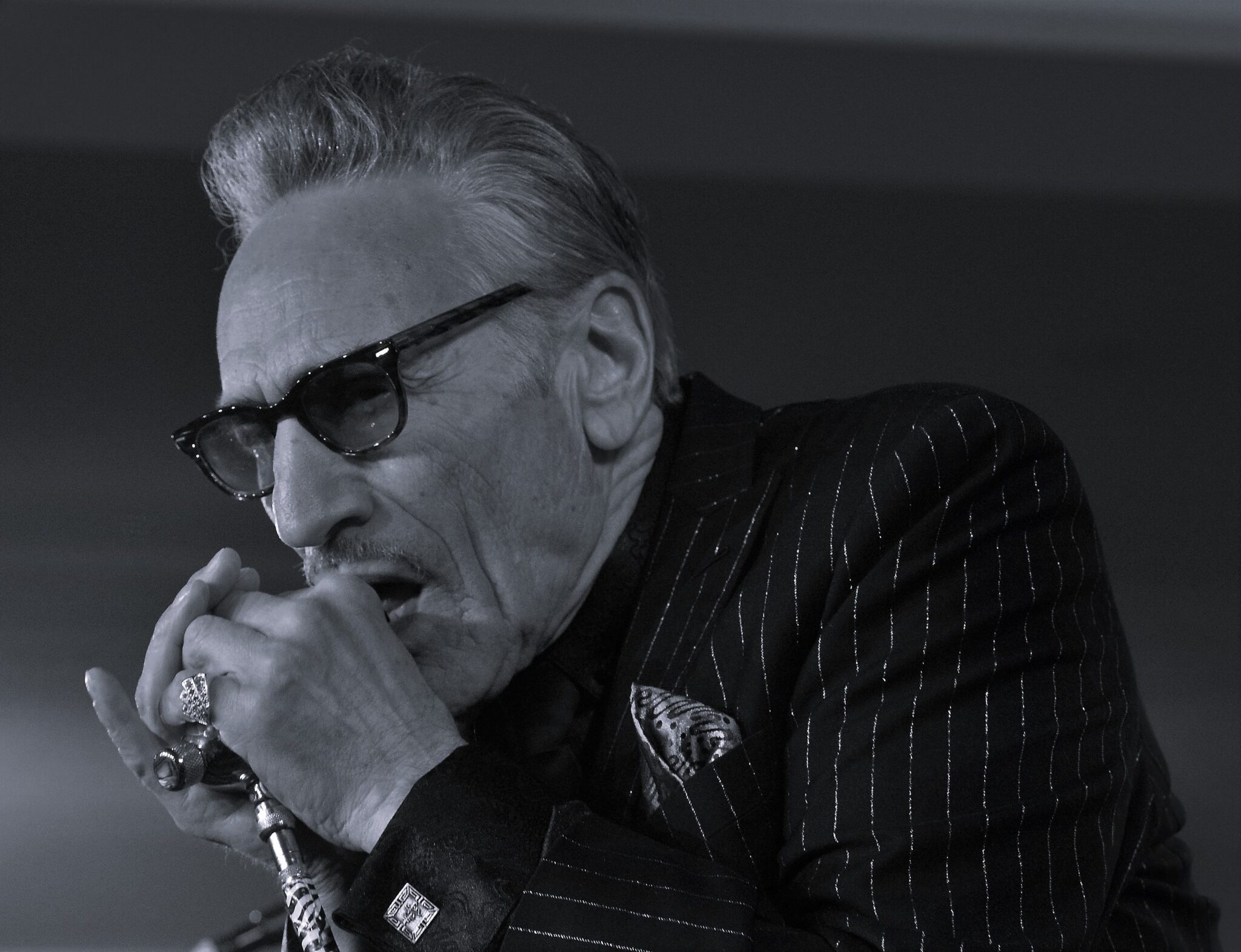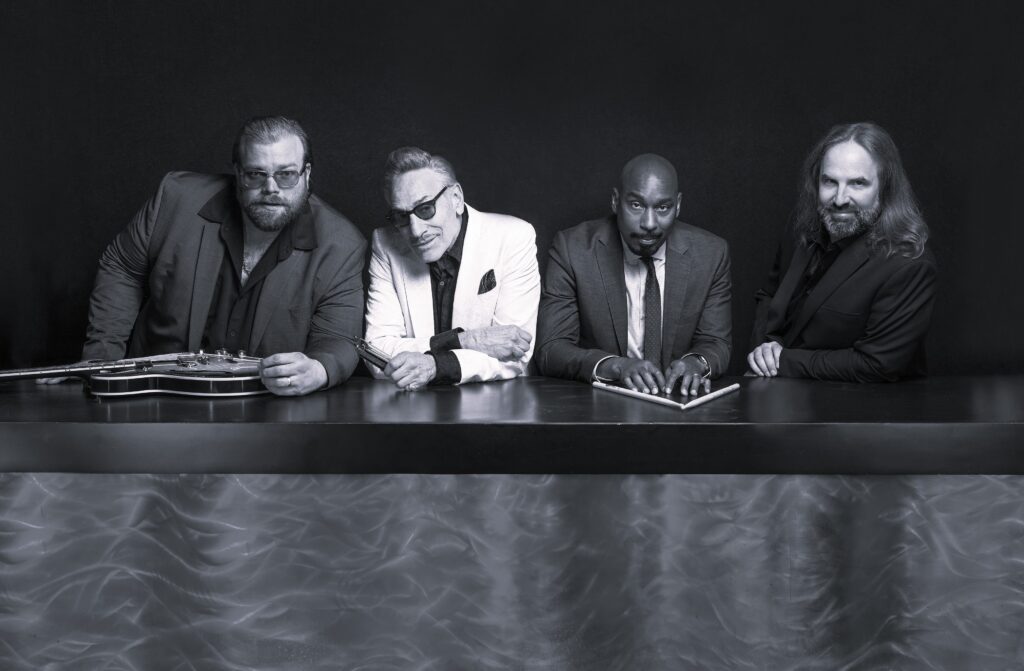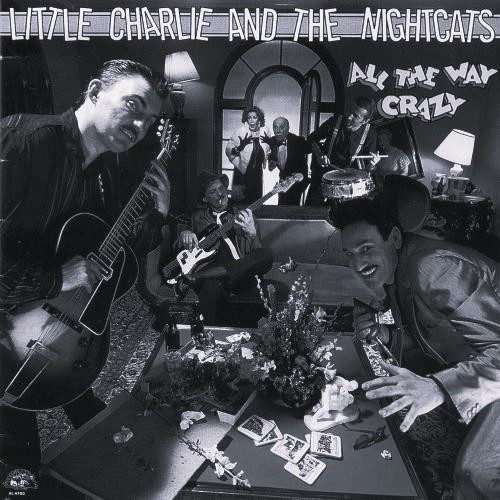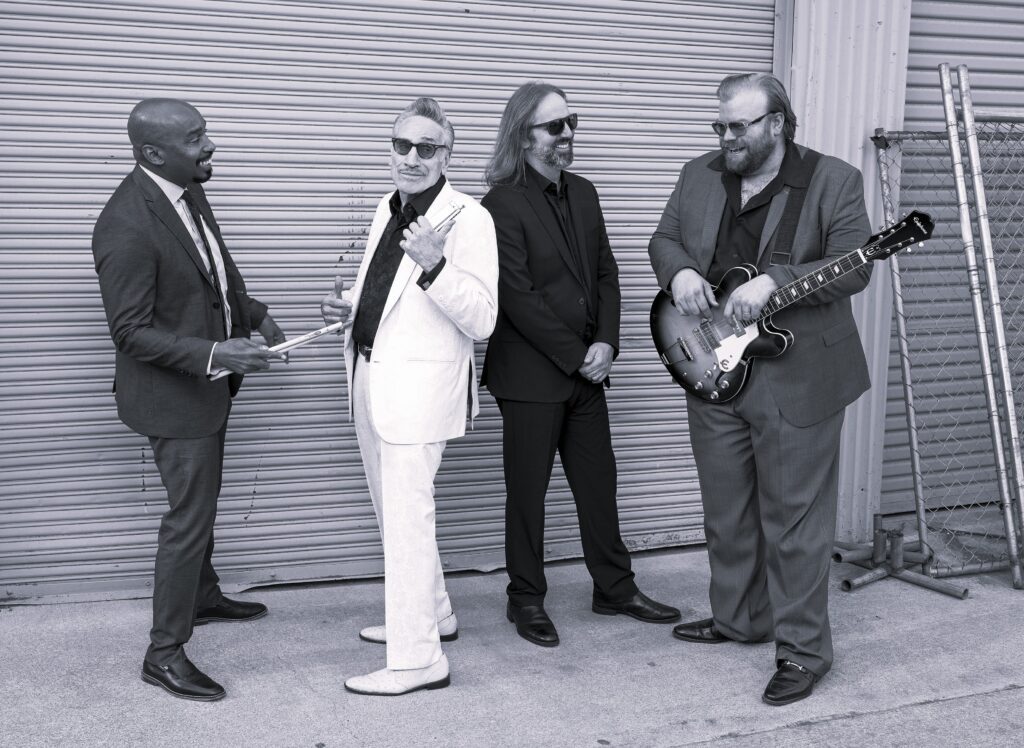Rick Estrin – Grooving The Blues
By Matteo Bossi
There’s really no need to introduce Rick Estrin, he’s been around for many years and probably every blues fan has had the chance to appreciate him on stage or on a record. At long last we had a long conversation with him just weeks before the new album, “The Hits Keep Coming”, comes out on Alligator Records. Another solid album infused with his very own sense of humour, a thing that has always marked his approach to music and life. “I like irony” he says right away. So we could not help but start out asking him, “Whatever happened To Dobie Strange?” to quote the title of the last number of the record. (Strange was the drummer of the first incarnation of Little Charly and The Nightcats.). And Estrin laughs, “I think because he has a good sounding name people remember that and ask about him! It’s funny, a guy contacted me just yesterday, who knows his brother and his brother said he’s alive and he’s doing fine. “
You put in that song all the silly questions people keep asking you
Yes, the same questions you hear over and over again…
In “The Circus Still In Town”, on the other hand. deals with serious topics, while the video is very funny.
I’ve always liked to have a lighthearted treatment of something serious, if you really listen to it it’s a serious subject.
It was a surprise to hear you sing a Leonard Cohen song, “Everybody Knows”.
I was surprised too! I was on my way to the studio when we were recording that album and I’ve never heard that song. Truthfully I’ve never paid attention to Leonard Cohen, when I was young I knew “Suzanne”, that was a hit record…I was wrong but I thought, what is that song about? What does that mean “she takes me down to a place by the river…she feeds you tea and oranges…I was very dismissive of him. Then I was driving to Greaseland and sometimes I listen to a station on the radio, it was Tom Petty’s radio station and he has a show called Buried Treasures, with all the stuff he likes. I never paid any attention to Tom Petty either, I had heard his biggest hits, you can’t avoid it, right? Somebody told me he played on Buried Treasures an old song of mine, “Don’t Do It”, so once I learned that, I thought well let me check this guy out. That’s my confession of how shallow I am! He was a great songwriter himself. So I listened to that station and that time the Leonard Cohen song came on and I thought, man what a great song! It’s the kind of stuff I would write if I’d thought about it. I told Kid about it when I got to the studio and he thought for about fifteen seconds or less…then he said we can do that, I can hear a way to approach it. And I think I argued with him for a couple of days, but he insisted and we did it. And I’m glad because I love the lyrics.
On that song you have the Sons of Soul Revivers singing.
Yes, we have them on a several others too, The Hits Keep Coming…they’re a great gospel group.
And you do a Muddy Waters song, “Diamond At Your Feet”, you go way back with Muddy.
Yes, he would no longer do that song when I saw him, it’s an old one…but it’s a cool song, I seem to gravitate towards death songs, I don’t know why…there are songs about deaths, on the previous record, “Father Time Chasing Me”…it’s ironic because secretly inside I think I’m immortal.
Over the years did your way of songwriting change a bit?
Well a couple of things did change. My approach to the music changed just because I used to write, not lyrically, but musically for Little Charlie’s preferences, his strengths. There are things that I wanted to do and that I did with this incarnation of the band that never would have worked with Little Charlie. He would not have felt comfortable with some of that stuff. And also now it’s a more collaborative effort. An example would be the Leonard Cohen song or on the last album a song called “Contemporary” which had all kind of stuff that I never would have thought of. A basic funk groove was already outside of Little Charlie kind of things, but Kid had a vision for the way the music was gonna go and the transition from the traditional intro that sounds like an old record and what happens next. There’s a lot more collaboration, Lorenzo (Farrell) is the glue that sticks everything together and sometimes you overlook that because it’s a guitar world….and then you can’t ignore D’Mar, who is a force of nature. It’s really like a team, not only in the contribution of everybody but in the spirit of it. And it’s genuine and when it is like that it transcends the music, there’s another component that’s intangible. I can feel it and I’ve seen in it in other bands. I remember the first time I really took note of it. It was years ago at a festival in Belgium I saw Otis Clay and he had a band from Chicago, I knew a couple of the guys since they played with Koko Taylor’s band…and it was just a killer band, they had a female trumpet player, you could just see they were happy and proud to be there and playing. It was something to see. The next time I saw Otis it was a couple of years later and that band was no longer there, he had the Hi Band, the Hodges brothers, how could you beat that, they made all those hit records. And they were great, they were perfect but they didn’t have the same spirit. Even when you have the people who are at the pinnacle of excellence, it’s a different thing when they’re hearts are not in it.
Talking about pinnacles, I guess one of them for you was seeing Muddy Waters as a teenager. He had Luther “Snakeboy” Johnson and Paul Oscher in the late sixties.
That was a life changer for me, man, hearing that. And it was the overall effect really. I’m older now, I have more experience and understanding of the different components that go into it. You mentioned Snake and man, that guy was such a great guitar player and had his own thing that fit so perfectly with Muddy, the way he would play it wasn’t like basslines on a guitar, but he played the bass strings and doing this interweaving thing with Muddy. He and Snake together just had this thing that was unique and beautiful, you know people talk about Muddy and Jimmy Rogers’s thing…but Snake had his way and it was really cool. He was something else. That night he and the band did that for me, I think I already had the idea of what I wanted to do, but they gave me something to shoot for, it brought everything into focus for me. There was so much stuff that happened back in a relatively short period of time that totally changed the whole direction of my life.
It was in those days that you befriended Rodger Collins?
Yes, shortly after that. When I saw Muddy I met Paul Oscher and became friends with him. I was probably about seventeen years old. By the time I was eighteen I got my first professional gig opening for ZZ Hill at the club Long Island, that’s when I met Rodger Collins and Fillmore Slim. Meeting those guys changed my life too.
And Rodger became kind of a mentor to you?
Oh absolutely and we’re still friends to this day. He’s 83 and Fillmore Slim is 89 years old. Travis Phillips another one. He was in Fillmore’s band, that’s how I met him. Sadly he died in 1971 or ’72 and if he had lived he could have a great career, he was a great guitar player and great singer. Travis was a monster, man! I met Freddie King one night when I was living in Chicago, he was a good guy, it was during the time when he was doing the records with Shelter, rock guys, and he was playing bigger places. He was in Chicago and TJ McNulty, who had been his drummer early on, when he had a trio with Big Mojo Elem, had a bar then. I knew Big Mojo, he was in Sam Lay’s band with me, and he told me Freddie King had a gig at TJ’s tavern on Roosevelt Road on the West Side. I went over and I met Freddie King on the break outside and I asked him if he knew Travis, from Texas. Travis was from Houston. He just lit up and said “man when I first went to Houston Travis Phillips had the baddest band in town!”. Different people I asked about him had that reaction. I asked Lazy Lester and he told me, “oh I always wonder what happened to that guy”, then he started doing the imitation of the way Travis looked when he played. Because he said he never looked at his fingers, he always looked either straight ahead or up, never at his hands.
When did you become friends with Jerry Portnoy?
It was when I was playing with Travis and Fillmore in California. I was in a record store and he was there. He was looking at some blues records and we started to talk, “you like that stuff too?”. It was not popular. And we became friends. We were both trying to learn how to play the harmonica and so we sort of help each other learn for a while. He would come to see me when I was playing. Then he had to leave and go back to Chicago, his father got sick and died not long after that, he had had a carpet store on Maxwell Street before. So he would send me postcards from Chicago, telling me “man this is so great, you can’t believe it, I sat in with the Aces…”. Then I think my girlfriend ran out of sense of humour and got rid of me…and I got some other girl to buy me a plane ticket to Chicago! I remember the first time I went to Theresa’s, Jerry and I ended up riding in Billy Boy Arnold’s car with Louis Myers…just listening to Louis talk, telling all these stories about Little Walter and all these different people. It was just like…
…kids in a candy store.
Oh for sure! I feel so lucky to have been around some of the greatest people that ever lived at a time when they were still active. I’ve had an amazing life.
You moved back and forth from Chicago to California for some time.
Yes, I didn’t know what I was gonna do…I had come back to California, I had a drug problem. I was a confused, messed up kid. By the end of 1975 I was in San Francisco and I went to a gig, Luther Tucker was playing. I saw Little Charly there. We had met two years earlier and we had talked about maybe one day starting a band together. He was a harmonica player at the time but he learned how to play guitar in that style of guitar, you know Robert Lockwood and Louis Myers…he would show guitar players how to play behind him. When I saw him at that gig he told me he had moved to Sacramento, prior to that he had been living in Berkeley, California. And he had started a band there, he was working on his guitar playing. He wrote me his phone number and he told me I should give him a call in about six months, he might be ready to play together. So months later I was living a pretty lowdown life, in the Tenderloin district in San Francisco my girlfriend was a hooker, she was a nice person, but that was the life style I was living…an incident happened, I was sick of myself, of living like that, of what I was doing to myself. I got mad at myself, I wanted to change. I remembered that matchbook cover that had Little Charly’s number on it: I went up in the apartment and somehow I knew where it was. I called him up and we talked. He had very few gigs but I took a Greyhound bus to Sacramento and we played and it seemed pretty good. I went back to San Francisco and then a couple of weeks later took another Greyhound up there again for another gig. Then I think we decided to really try and so the next time I took the Greyhound I decided to stay. And I’ve been there ever since. Sacramento, especially then, was a small town and it was something I needed at the time to slow down.
A few months ago I was talking with your friend Marcel Smith, you go way back.
Oh I love Marcel, we met a little bit after that…we had started to become popular locally. Marcel was still in the gospel group and he was doubling in R&B with the Soul Prophets, they were also popular locally. That’s when I first saw him and he blew my mind. He was probably 22 or something and he was a grown, mature man, from twenty years before that. In that times, the mid-eighties, soul singers were singing like Charles Wilson from the Gap Band, which is great but a whole different style of singing, Stevie Wonder probably started that style…while Marcel was totally from the Sam Cooke, Ira Tucker, Archie Brownlee…that old school, he was just amazing. He’s a great guy and I’m so happy he’s getting some attention. When I first moved here Marcel was still in church, Johnny Hearstman was on the scene, playing every week.
How did you get involved with Jim Pugh and Little Village Foundation?
I think Little Village was just an idea, then what happened is I met Wee Willie Walker…I friend of mine, Julia Schroeder who lives in Minneapolis, we were playing there and after the soundcheck she said I want to take you to see Willie Walker. We went to a happy hour in a neighborhood tavern and it was just him and a guitar player. People were just talking and here was this guy that I knew from the records, but I didn’t know if was still performing or anything. When Julia told me I said “do you mean the From Warm To Cool Willie Walker?” And she said yes. He was so great, he had not lost anything. And I just said to myself I got to do something. Back in the club I told Kid about him, and he has Greaseland…so we said let’s make a record with this guy! That’s what happened. Jim (Pugh) played on the record and he had been thinking to start something like a no-profit Foundation. Making that record was a dream come true. I picked a bunch of songs and sent them to him and picked the ones that he liked. I’ve got a couple of my own songs on that record and whatever ideas me or Kid had we could make that happen. And we had one of the greatest living soul singers there, people don’t even know how good he was. When we were mixing that record we were listening to different takes, passages and they were all perfect, we couldn’t figure out which one to use, they were all great. And he would be reading the lyrics because all the songs were new to him, and he sounds like his heart is breaking…as far as a vocal performance he was a genius. And a sweetheart of a guy. I have this soul ballad that I had written on the record, “What Love Can Do”, which is good song, I was watching through the glass while he was singing it and all the hair on my arms was standing up…I went in the booth when it was over and I just gave him a hug and he had tears coming out of his eyes. What a great person he was and a great singer.
After that you took part in other Little Village recordings at Greaseland, like Sonny Green, John Boyd, Alabama Mike or Marcel Smith… It really feels like a community thing.
It is a community indeed, some of those I had more to do than others, like Marcel. I knew him, I’m the one who brought him to Jim, so especially his first record I was the one that made it happen. John Boyd is a guy Kid knew, I was there and I just wanted to help. And I’m just a fan of Alabama Mike, to me he is a great songwriter and a killer singer, a total original performer. I was recording a long time before I got with Kid and it’s a different experience, his personality is so relaxed and yet he is so efficient, you’re not wasting time ever. He’s got a big heart and it makes everybody feel good, that kind of thing is important in a recording studio, how people feel.
Other artists, beside Willie Walker, have recorded your songs, how does that feel to you?
Oh I love it, I think it’s great. It hasn’t happened that often. Robert Cray did one a long time ago, John Hammond did a couple of others, Koko Taylor was great and Tia Carroll covered that same song recently, it was pretty cool, she’s a great singer too. Frank Bey did a couple of other songs, that guy’s passing was another big loss. I wish more people would do them! I love writing songs, you can do a great performance but then it’s gone, a song remains what it is, you can do different treatments but what you’re trying to say it’s still there.
All of your records have been with Alligator, is it different now than it was in the eighties, with so much history together?
It’s very different now. One thing is Bruce has a lot of trust in Kid for making the record, he doesn’t feel like he needs to be closely involved. That’s a difference. Back then we were new, blues was having a resurgence in popularity, we were a local band and we got signed by the biggest label in the blues world, it was fariytale kind of stuff for us. Our first album had ten songs on it and five of them were covers, I figured out pretty early that even if I wasn’t writing so many songs, I would pick songs that people were not familiar with. In that way if they liked the song, they had to come see us. I didn’t wan to understand how songwriting works, or the work part of it! So I wrote songs once a year… Soon as the first one came out we started touring all over the world, that was a brand new experience. So when we had to make another record, I needed to come up with songs, it’s like a parking meter you keep put the money in…I learned to shake loose and started ballrolling, the writing process it’s work but it’s also fun. What a joyful thing to do for work.
Did anyone give you good advice about songwriting?
Oh yes, Rodger Collins for one. He showed me stuff decades before, I saw how his attitude was working…he always had his ears open for ideas, always thinking about that. I learned to come up with something that people could identify with, you want it to be interesting, the meter has to be consistent throughout the song…a lot of things. He would keep editing and editing, I saw how he did it. One of the first songs I wrote with Little Charly was “TV Crazy” and at that time I didn’t think we would ever make a record so…I thought it was a good song and people liked it when we did it in clubs. I had a friend, Troyce Key, who had Eli Mile High, he had a band with JJ Malone, they had made a record on Red Lightnin’, the english label. And it occured to me that Troyce could do a good job with that song so I thought maybe they can put it on their next record. I drove down to Eli’s, it was daytime and Percy Mayfield was playing that night. He was hanging on with Troyce outside the building, it was a beautiful day, they were in the yard and it was the first time I ever met Percy. I showed the song to Troyce, just singing it and Percy started to sing along on the chorus and he was laughing and when the song was over he said to me, “you wrote that? It’s a good song”. That was some validation! I’m interested in songs, in songwriting, it’s magic, that’s one of the main reasons Alabama Mike is so special. It could come from anywhere, my imagination, something that I heard somebody say…when I need songs to make a record I’m focused, I gotta have the pressure sometimes. I thought I had to be inspired, now I’v learned effort to effort I can induce inspiration. It takes work to get there.
Sometimes you have written with other artists, Dave Alvin for exemple.
Yes, Dave Alvin and there was another friend I wrote a couple of songs with early on named Donnie Woodruff. Those two guys were the easiest I ever wrote with. Donnie was a great songwriter, he was more a soul/R&B guy and a great singer too. He understood blues, because of his dad. We had really an unspoken arrangement if it was my song that he was helping me with he would come up with suggestions and it didn’t bother him if I didn’t like his ideas, he would just keep coming up with stuff until he’d find something that I did like. He was an R&B artist on RCA Victor, sometimes I would help him, and it was the same way…our egos didn’t get involved. Because we were both fan of each other, it just worked fine, we tried to help each other. Dave Alvin was super easy to work with, he understands songwriting and blues and he could see where I was going. What happened was I had a couple of songs that for some reason I was stuck, I needed to finish them for a record and I just wasn’t feeling it. I showed them to him and he said “oh yes I can work with that”. He came up with other parts and others we worked on together, he’s a real writer. Other people I tried to write with, I won’t call their names, it was more difficult.
You did a couple with another friend Joe Louis Walker, he also produced one of your records many years ago.
Oh yes, and there is another on the previous record, “Resentment File”. I wrote that, but that was something Joe said. There are two other writers on that, Joe Russo who’s written a bunch songs for Elvin Bishop. I think Joe went into an argument with his girlfriend and Joe (Walker) said something like “oh man you’re going in the resentment file for saying that”. Joe told me about it and I finished the song, I could see exactly how the story would go. I first met Joe when I was playing with Fillmore Slim and Travis Phillips, our regular gig for almost a year was at this Playpen club five nights a week. Fillmore is a pimp you know, and at that time they were finding this pipeline in Alaska, tons of men were going there to work. So Fillmore took a bunch of his ladies and went to Alaska with them. He left the band, music was not his primary source of income! Travis kept the band and six months later Fillmore came back and he had Joe with him, said this was his new guitar player. That’s when I met him. We were both teenagers I think it was 1967 or ’68. And he was great back then, he’s so talented, he can do so many different things people don’t even know about. One time he brought me over to this Mustique festival in the carribean, with a lot of rich people, and there was a guy, the caterer, a jamaican who was into music and he started doing freestyle rapping and Joe started going back and forth with him, making this stuff up on the spot in the jamaican patois. Who knew he could do that? He blew my mind really.














Comments are closed